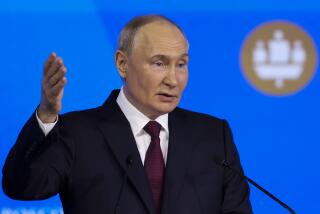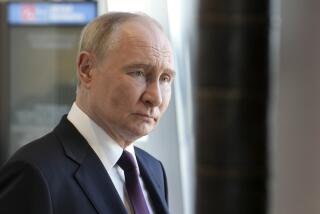Gorbachev Says He Will Seek Investment, Not Handout
- Share via
MOSCOW — Soviet President Mikhail S. Gorbachev said Tuesday that he will not be seeking economic assistance when he meets leaders of the Group of Seven, the West’s major industrial nations, in London next week--but will be looking for foreign investment in his country.
Acknowledging as “a task for us” the burden of transforming the Soviet economy from state ownership and central planning so that market forces and entrepreneurship prevail, Gorbachev said that what the Soviet Union needs from the West is to be quickly included in the world economy so that it can buy and sell without political barriers.
“I believe there are no free financial resources in the world,” Gorbachev told a press conference, “and when we speak about cooperation we are referring to investment credits. . . . This will be the main direction of our economic cooperation with other states.”
This was a major shift for Gorbachev who, less than two months ago, talked of Western assistance in terms of $100 billion, the amount that the United States and its allies spent in the Gulf War, and whose advisers have argued for $15 billion to $30 billion in aid annually for five or six years to underwrite Soviet reforms.
In briefing leaders of nine of the country’s constituent republics on the reform program that he will present at the Group of Seven summit, Gorbachev had also declared his intention not to seek direct economic assistance but to emphasize the role that credits could play in helping to speed the country’s development and underwrite its shift to a free-market economy.
“We have agreed that Gorbachev will not ask for money,” Boris N. Yeltsin, the president-elect of the Russian Federation, told correspondents on Tuesday. “The aim of the trip is to say firmly that the center and the nine republics are committed to radical reform, the transition to a market-based economy, diverse forms of ownership and privatization.”
The republic leaders also gave their approval to the government’s economic stabilization and reform program, which aims through both tough administrative controls and market-based measures to halt the Soviet economy’s sharp decline and ready it for fundamental changes.
The agreement was reached, according to the official Soviet news agency Tass, only after the central government yielded some of its taxation powers to the Russian Federation and the Ukraine, the two largest republics, to give them greater control over their wealth.
Under a compromise reached with Gorbachev on Monday, the two republics will contribute only fixed sums to the central budget, Tass said. This should also clear the way to signing a new Union Treaty, laying the political basis for establishing a federal governmental system for the country.
Gorbachev said he hoped that final amendments to the treaty could be discussed shortly and that it would be signed before the end of the month.
Sketching the approach that he will take next week at the Group of Seven summit, Gorbachev avoided all suggestions that the Soviet Union was searching for massive assistance.
He noted that the Supreme Soviet, the country’s legislature, had recently passed laws giving foreign investors equal standing with Soviet enterprises, allowing them to establish wholly owned subsidiaries here and making it possible for them to buy Soviet companies as they are privatized over the next two years.
“This is an important moment for us,” Gorbachev said. “We would like to count on cooperation (with the West) both today and tomorrow, and in dealing with the political problems of entering the market we could use the help of more effective cooperation with the industrially developed countries.”
He asserted that, while the Soviet Union’s political relations with the West have improved markedly in recent years, its economic relations have remained virtually the same--distant, based largely on conventional trade and a few projects and restricted by many Cold War policies.
“Instead of just trade and separate projects, we must introduce the whole organism of the Soviet economy into the world market, into the global economy,” Gorbachev said. “We have the political preconditions for this, but much remains to be done, both by the Soviet Union and others, to achieve it.
“We have embarked on extensive democratic changes (establishing a free-market economy). This is our choice, and we need to do it. This is our problem, our burden, our responsibility. We must bear the burden in connection with these deep changes.
Gorbachev’s approach won the back of visiting Spanish Prime Minister Felipe Gonzalez, who said, “The important thing is the orientation of the economy, and there is no doubt that the economy of the Soviet Union is being opened now to the world.”
More to Read
Sign up for Essential California
The most important California stories and recommendations in your inbox every morning.
You may occasionally receive promotional content from the Los Angeles Times.













